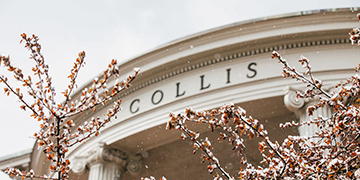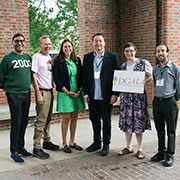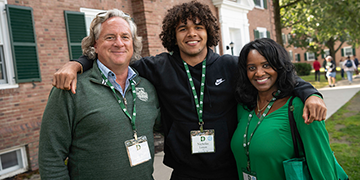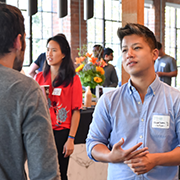Classmates Honor a Professor and Celebrate an Unforgettable Term Abroad
Five members of the Class of 1990 say thank you to Professor Emerita Heide Whelan by establishing a scholarship fund.
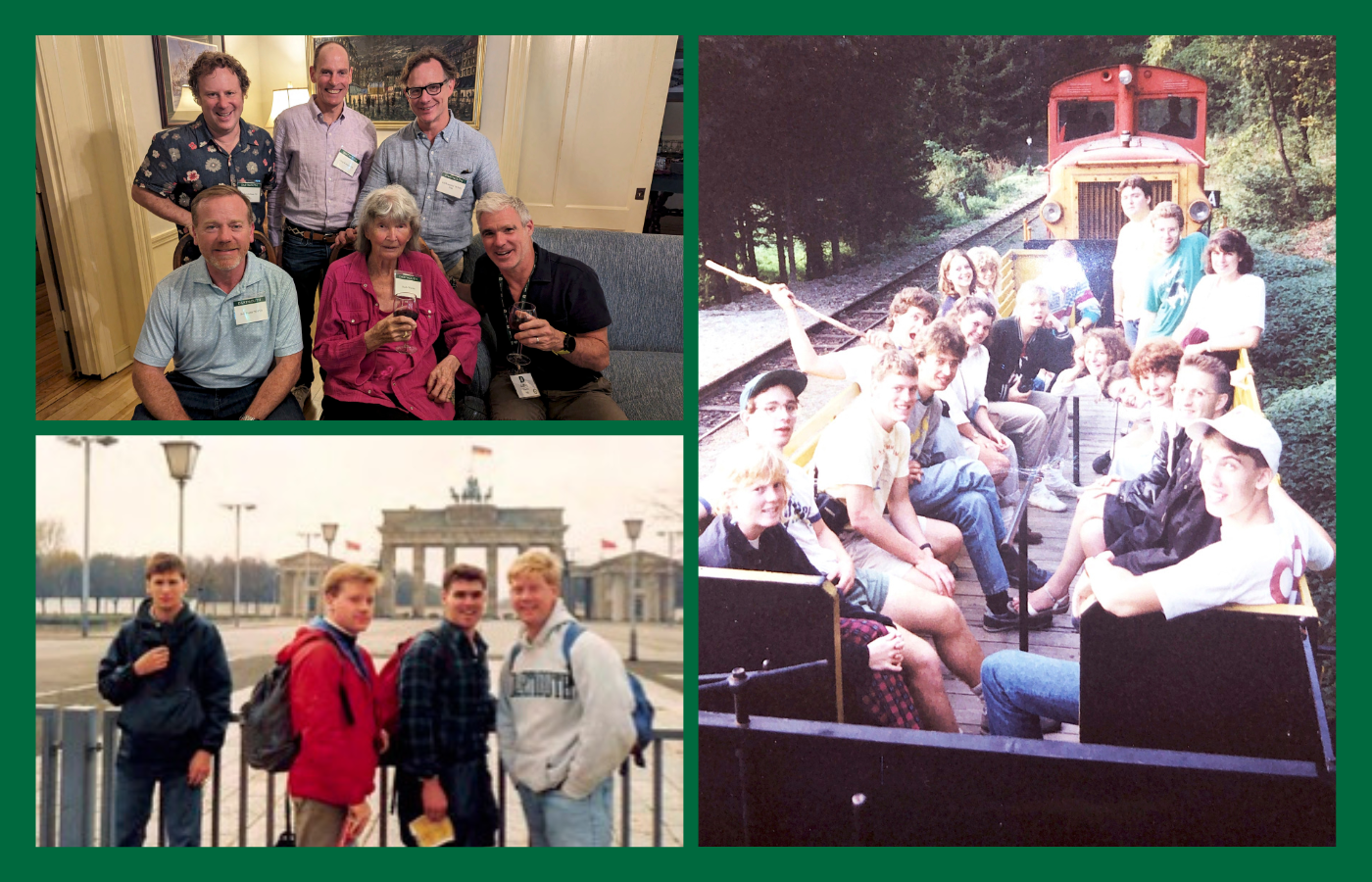
Mar 11, 2025
5 minute read
James Bressor
5 minute read
Rob Harris and Jeffrey Martz, both members of the Class of 1990, remember their junior year foreign study program in Budapest as an indelible exploration into the diversity of cultures and the commonality of humans. In particular, they continue to appreciate the wise, trusting supervision of Professor Heide Whelan, who led the FSP.
Although Glasnost and Perestroika would soon bring major change to Central Europe, Hungary in 1988 was still a Soviet bloc nation, a place few Americans visited. To meet Hungarians and citizens of other Central European nations who were eager to speak with westerners was an experience, made possible by Whelan, that Harris and Martz have never forgotten.
“We had a fantastic group of students who were fun but also very serious about our studies,” says Martz. “Professor Whelan wanted us to venture out and make the link between history, current politics, what we were seeing, what we were hearing, and what we were feeling. She encouraged us to travel every weekend, even if it meant coming back Monday afternoon and perhaps missing a class. But Heide did not cut us any slack. You had to get all your work done.”
Harris adds, “Professor Whelan was a student’s teacher. She had high expectations—she did not suffer fools—but she made everything interesting or fun. And when fun and rigor collide, that’s where something special happens.”
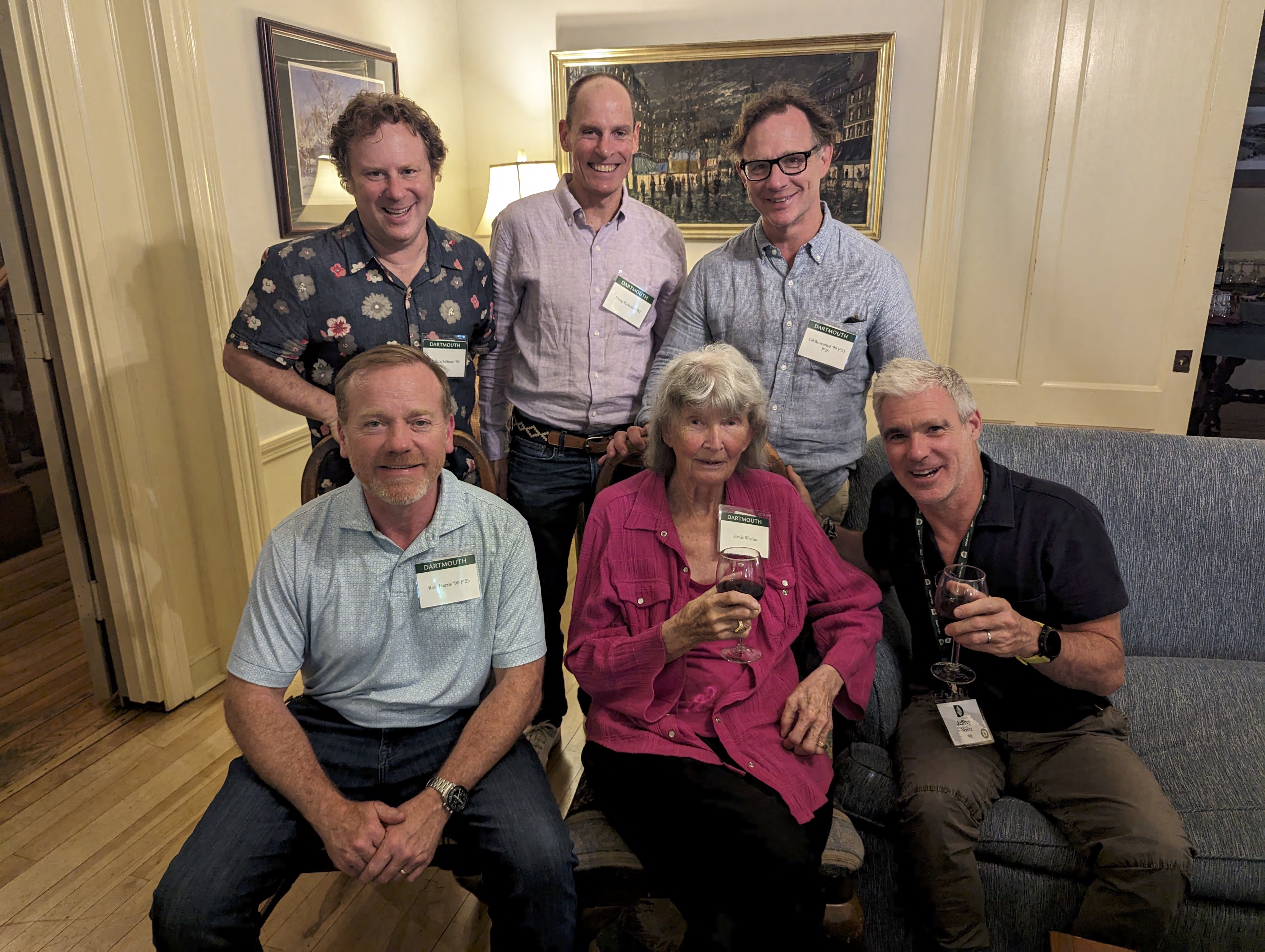
Pictured: Rob Harris, front left, and Jeffrey Martz, front right, flank Professor Emerita Heide Whelan at a gathering to celebrate a scholarship fund, named in honor of Whelan, that supports students who want to pursue off-campus study.
To express their gratitude to Whelan and celebrate their term in Budapest, Harris, Martz, and three friends in the Class of 1990 have established the Professor Heide W. Whelan Scholarship Fund for Off-Campus Programs to support students who might not otherwise pursue off-campus study. The five classmates—Harris, Martz, Marc Kramer, Jeff Matusow, and David “Dewey” Winebrenner—have committed $250,000 to the scholarship fund.
Whelan says she’s honored to have an endowed scholarship established in her name. Like the five classmates, she warmly remembers the fall 1988 term in Hungary, in part because her two children, teenagers at the time, joined her in Budapest.
“I have fond memories of that group. We got along very well,” says Whelan, now a professor emerita of history who retired from teaching in 2013.
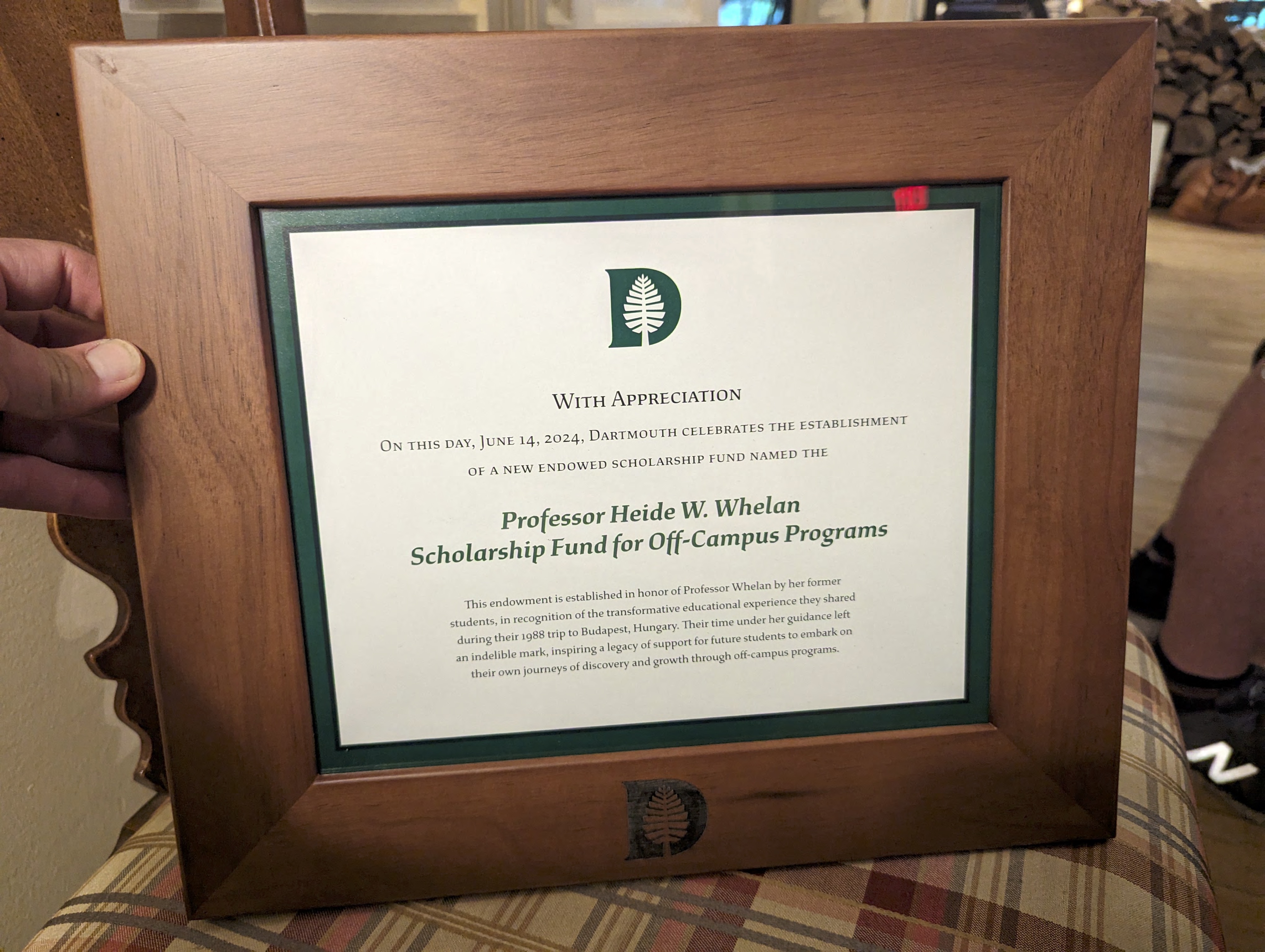
Whelan grew up in the West German city of Lübeck, which bordered East Germany; Soviet tanks were stationed less than a mile from her childhood home, fueling what became a lifelong fascination with Russia. She emigrated to the United States in 1962, joined Dartmouth’s Department of History in 1973, and was soon recognized as a leading expert in Russian history. She helped develop and co-taught “Introduction to the Soviet Union,” a popular interdisciplinary course that Harris remembers well. “It was held in a lecture-style classroom, with probably 100 students enrolled. It was one of the few classes at Dartmouth with that many students. It was always oversubscribed,” he says.
Harris and Martz recall that a group of friends on the Budapest FSP traveled every weekend, having to navigate by paper maps in a time before GPS and smartphones.
“We were driving through villages and small towns, and we would stop for gas,” Martz says. “There weren’t a lot of people who spoke English, but it was fairly evident that we were Americans. That always piqued interest in the people around us, but I never felt unsafe. We looked at it more like an adventure.”
“Oh, we had all sorts of adventures,” says Harris. “One weekend, we drove all the way through Yugoslavia, way down to Dubrovnik, in a van. We were running out of gas, so we stopped at a farmer’s house. He had never met Americans before. He broke out a bottle of pálinka, and we had to do shots before he would tell us where the nearest gas station was.”
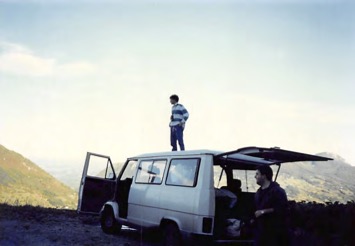
Pictured: Students enjoy the countryside on their way to Dubrovnik, Yugoslavia (now Croatia). Jeff Matusow is standing on the roof, and David Permut is next to the hatch.
Another time, they risked drawing the attention of Romania’s infamous secret police, the Securitate, to clandestinely have dinner and stay overnight with a local family. “The meal ended with an epic dessert—a spectacular, gelatinous salad with all sorts of stuff in it that we later termed ‘the wheel of poison,’” says Harris. “It was great fun, but they didn’t have to do this for us. These were people who had almost nothing, who took a lot of their food, made this meal for us, and put us up in their apartment at personal risk to themselves.”
Whelan says she sometimes worried about her students traveling through multiple countries, but she wanted them to explore and have the opportunity to learn and mature by meeting people who were living very different lives.
“We had a system,” she says. “The students would leave envelopes with me, with details inside telling me where they were going for the weekend. I wanted them to experience their independence, but I still wanted to know where they were in case they did not return by 5 o’clock on Monday. If they didn’t return, I would open the envelope. Otherwise, I returned the envelope to them unopened.”
How many envelopes did she have to open during that term? None.
Harris and Martz say they’re delighted to help future students explore the world through a term of off-campus learning.
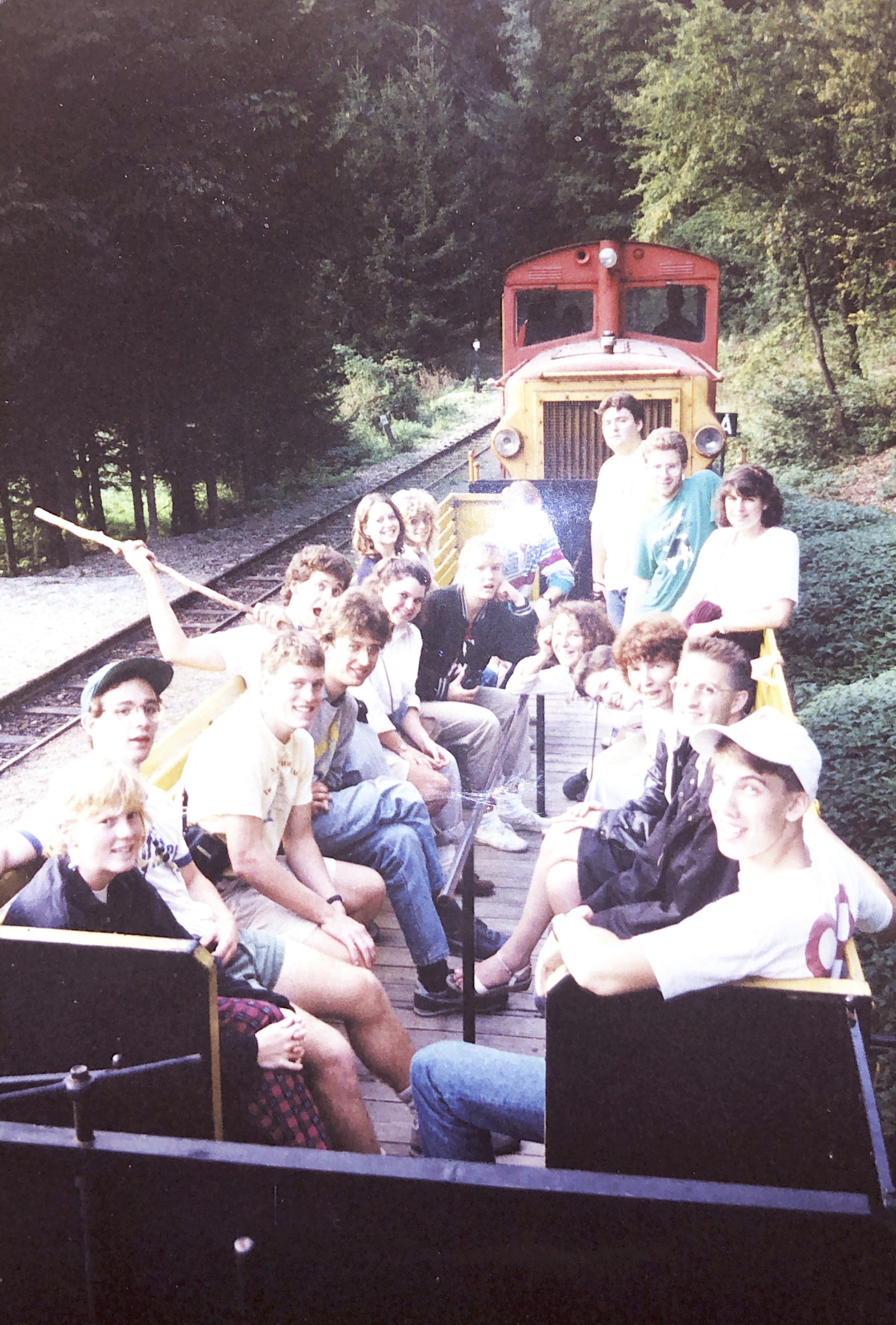
“It’s healthy to put yourself outside your comfort zone, to see a new country or a new culture, and to meet people. It gives you perspective, and I love doing that still today,” says Martz, who lived and worked in Russia for many years. “That perspective becomes even more powerful when you’re learning. It’s fun visiting a country with your friends from school. When it’s done in a structured, educational way so you’re learning about the culture, that allows you to go deeper and appreciate the experience more.”
Harris adds that foreign travel develops a richer appreciation for the diversity of cultures and governmental systems while also fostering a greater awareness of a shared global humanity.
“That’s what made Dartmouth special,” he says. “It wasn’t just learning a language and history, but also giving people the opportunity to make connections.”


